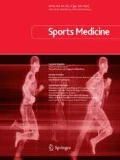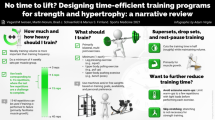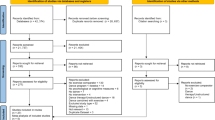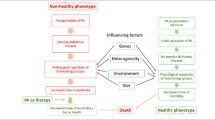Abstract
This systematic review describes the effect of exercise training on physical performance in frail older people. Randomized controlled trials were identified from searches in PubMed, EMBASE and CENTRAL from January 1995 through August 2007. Two reviewers independently screened the trials for eligibility, rated their quality, and extracted data. Randomized controlled trials that examined the effects on performance-based measures of physical function among frail older adults were included. The systematic search identified 20 studies, examining 23 different exercise programmes. The methodological quality score (0–9) of the trials ranged from 2 to 7 points. Sixteen of the studies were scored as high quality. There was a large variety in the studies concerning sample size, degree of frailty, types of interventions and types of assessments. The majority of the programmes were facility-based, group-exercise programmes that were performed three times a week for 45–60 minutes. The intervention programmes comprised resistance training (n = 9), Tai Chi training (n = 2), or multi-component training (n = 12). Six of the total selected 20 studies did not find a beneficial exercise effect on functional performance. This systematic review suggests that older adults with different levels of abilities can improve their functional performance by regular exercise training. To determine the most appropriate design of the exercise programme (type, intensity, frequency and duration of exercise) for functional improvement or prevention of loss of function, more high-quality trials are needed in which different training protocols are compared.



Similar content being viewed by others
References
Chin A Paw MJM, Dekker JM, Feskens EJ, et al. How to select a frail elderly population? A comparison of three working definitions. J Clin Epidemiol 1999 Nov; 52 (11): 1015–21
Fried LP, Ferrucci L, Darer J, et al. Untangling the concepts of disability, frailty, and comorbidity: implications for improved targeting and care. J Gerontol A Biol Sci Med Sci 2004 Mar; 59 (3): 255–63
Fried LP, Tangen CM, Walston J, et al. Frailty in older adults:evidence for a phenotype. J Gerontol A Biol Sci Med Sci 2001 Mar; 56 (3): 146–56
Walston J, Hadley EC, Ferrucci L, et al. Research agenda for frailty in older adults: toward a better understanding of physiology and etiology: summary from the American Geriatrics Society/National Institute on Aging Research Conference on Frailty in Older Adults. J Am Geriatr Soc 2006 Jun; 54 (6): 991–1001
Luchner DM, Wagner EH. Preventing frail health. Clin Geriatr Med 1992 Feb; 8 (1): 1–17
Keysor JJ, Jette AM. Have we oversold the benefit of late-life exercise? J Gerontol A Biol Sci Med Sci 2001 Jul; 56 (7): 412–23
Fiatarone MA, O7’Neill EF, Ryan ND, et al. Exercise training and nutritional supplementation for physical frailty in very elderly people. N Engl J Med 1994 Jun; 330 (25): 1769–75
Verhagen AP, de Vet HC, de Bie RA, et al. The Delphi list: a criteria list for quality assessment of randomized clinical trials for conducting systematic reviews developed by Delphi consensus. J Clin Epidemiol 1998 Dec; 51 (12): 1235–41
Heyn P, Abreu BC, Ottenbacher KJ. The effects of exercise training on elderly persons with cognitive impairment and dementia: a meta-analysis. Arch Phys Med Rehabil 2004 Oct;85 (10): 1694–704
van Uffelen JGZ, Chin A Paw MJM, Hopman-Rock M, et al.The effects of exercise on cognition in older adults with and without cognitive decline: a systematic review. Clin J Sport Med. In press
Verhagen AP, Karels C, Bierma-Zeinstra SM, et al. Exercise proves effective in a systematic review of work-related complaints of the arm, neck, or shoulder. J Clin Epidemiol 2007 Feb; 60 (2): 110–7
Binder EF, Brown M, Sinacore DR, et al. Effects of extended outpatient rehabilitation after hip fracture: a randomized controlled trial. JAMA 2004; 292 (7): 837–46
Baum EE, Jarjoura D, Polen AE, et al. Effectiveness of a group exercise program in a long-term care facility: a randomized pilot trial. J Am Med Dir Assoc 2003 Mar; 4 (2): 74–80
Binder EF, Schechtman KB, Ehsani AA, et al. Effects of exercise training on frailty in community-dwelling older adults:results of a randomized, controlled trial. J Am Geriatr Soc 2002 Dec; 50 (12): 1921–8
Boshuizen HC, Stemmerik L, Westhoff MH, et al. The effects of physical therapists’ guidance on improvement in a strength training program for the frail elderly. J Aging Phys Act 2005;13 (1): 5–22
Brown M, Sinacore DR, Ehsani AA, et al. Low-intensity exercise as a modifier of physical frailty in older adults. Arch Phys Med Rehabil 2000 Jul; 81 (7): 960–5
Chin A Paw MJM, de Jong N, Schouten EG, et al. Physical exercise and/or enriched foods for functional improvement in frail, independently living elderly: a randomized controlled trial. Arch Phys Med Rehabil 2001 Jun; 82 (6): 811–7
Faber MJ, Bosscher RJ, Chin A Paw MJM, et al. Effects of exercise programs on falls and mobility in frail and pre-frail older adults: a multicenter randomized controlled trial. Arch Phys Med Rehabil 2006 Jul; 87 (7): 885–96
Hauer K, Pfisterer M, Schuler M, et al. Two years later: a prospective long-term follow-up of a training intervention in geriatric patients with a history of severe falls. Arch Phys Med Rehabil 2003 Oct; 84 (10): 1426–32
Hruda KV, Hicks AL, McCartney N. Training for muscle power in older adults: effects on functional abilities. Can J Appl Physiol 2003 Apr; 28 (2): 178–89
Latham NK, Anderson CS, Lee A, et al. A randomized, controlled trial of quadriceps resistance exercise and vitamin D in frail older people: the Frailty Interventions Trial in Elderly Subjects (FITNESS). J Am Geriatr Soc 2003 Mar; 51 (3): 291–9
Lazowski DA, Ecclestone NA, Myers AM, et al. A randomized outcome evaluation of group exercise programs in long-term care institutions. J Gerontol A Biol Sci Med Sci 1999 Dec; 54 (12): 621–8
Lord SR, Castell S, Corcoran J, et al. The effect of group exercise on physical functioning and falls in frail older people living in retirement villages: a randomized, controlled trial. J Am Geriatr Soc 2003 Dec; 51 (12): 1685–92
Seynnes O, Fiatarone Singh MA, Hue O, et al. Physiological and functional responses to low-moderate versus high-intensity progressive resistance training in frail elders. J Gerontol A Biol Sci Med Sci 2004 May; 59 (5): 503–9
Shimada H, Obuchi S, Furuna T, et al. New intervention program for preventing falls among frail elderly people: the effects of perturbed walking exercise using a bilateral separated treadmill. Am J Phys Med Rehabil 2004 Jul; 83 (7): 493–9
Westhoff MH, Stemmerik L, Boshuizen HC. Effects of a low intensity strength-training program on knee-extensor strength and functional ability of frail older people. J Aging Phys Act 2000; 8 (4): 325–4
Witham MD, Gray JM, Argo IS, et al. Effect of a seated exercise program to improve physical function and health status in frail patients =70 years of age with heart failure. Am J Cardiol 2005 May; 95 (9): 1120–4
Wolf SL, O’Grady M, Easley KA, et al. he influence of intense Tai Chi training on physical performance and hemodynamic outcomes in transitionally frail, older adults. J Gerontol Med Sci 2006; 61A (2): 184–9
Worm CH, Vad E, Puggaard L, et al. Effects of a multicomponent exercise program on functional ability in community dwelling, frail older adults. J Aging Phys Act 2001; 9 (4): 414–24
Sullivan DH, Roberson PK, Smith ES. Price JA, Bopp MM. Effects of muscle strength training and megastrol acetate on strength, muscle mass, and function in frail older people. J Am Geriatr Soc 2007 Jan; 55 (1): 20–8
Miller MD, Crotty M, Whitehead C, et al. Nutritional supple mentation and resistance training in nutritionally at risk older adults following lower limb fracture: a randomised controlled trial. Clin Rehab 2006; 20: 311–23
Chin A Paw MJM, van Poppel MNM, Twisk JWR, et al. Once a week not enough, twice a week not feasible? A randomised controlled exercise trial in long-term care facilities ISRCTN87177281]. Patient Educ Couns 2006 Oct; 63 (1-2): 205–14
King AC, Taylor CB, Haskell WL. Effects of differing intensities and formats of 12 months of exercise training on psychological outcomes in older adults. Health Psychol 1993 Jul; 12 (4): 292–300
King AC, Haskell WL, Young DR, et al. Long-term effects of varying intensities and formats of physical activity on participation rates, fitness, and lipoproteins in men and women aged 50 to 65 years. Circulation 1995 May; 91 (10): 2596–604
Altman DG. Better reporting of randomized controlled trials:the CONSORT statement. BMJ 1996; 313: 570–1
Acknowledgements
The study was financially supported by the EMGO Institute, Department of Public and Occupational Health, VU University Medical Center, Amsterdam, the Netherlands, and Body@Work, Research Center Physical Activity, Work and Health, TNO-VU University Medical Center, Amsterdam, the Netherlands. The authors have no conflicts of interest directly relevant to the contents of this article.
Author information
Authors and Affiliations
Rights and permissions
About this article
Cite this article
Paw, M.J.M.C.A., A, C., van Uffelen, J.G.Z. et al. The Functional Effects of Physical Exercise Training in Frail Older People. sports med 38, 781–793 (2008). https://doi.org/10.2165/00007256-200838090-00006
Published:
Issue Date:
DOI: https://doi.org/10.2165/00007256-200838090-00006




